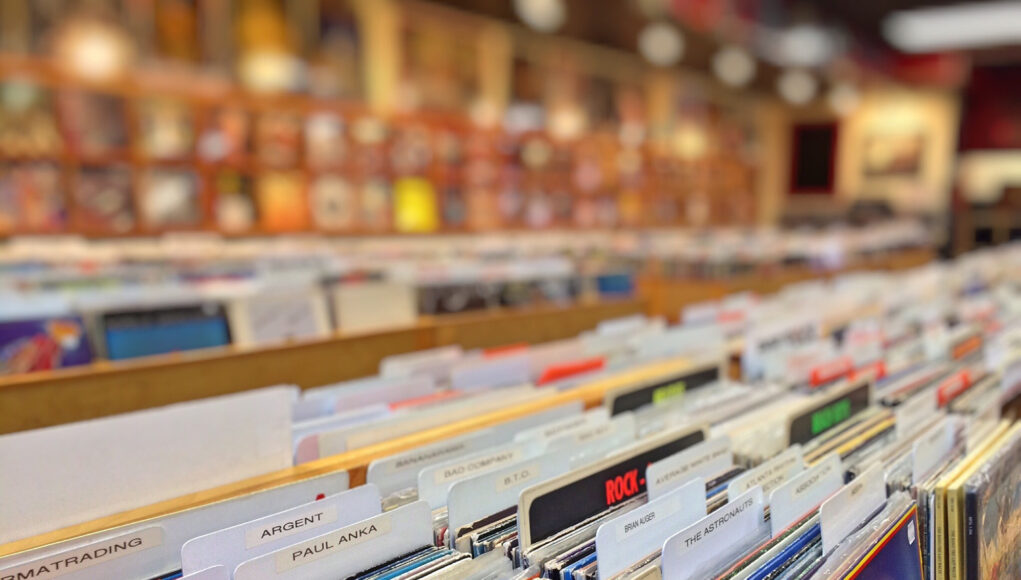By Glenn Fosbraey, University of Winchester
Streaming may still be the preferred method of music consumption for the vast majority of us in 2024, but vinyl, cassettes, and even the long-unloved CD format have shown resurgence in recent years.
In fact, physical sales are so healthy that HMV has risen from the ashes and returned to its flagship store on Oxford Street. And much of this can be attributed to pop star Taylor Swift, who currently has seven of her albums in the vinyl charts, including all of the top three places via 1989 (Taylor’s Version), Speak Now (Taylor’s Version) and Midnights.
According to Lawrence Montgomery, the managing director of Rough Trade record stores, Swift owes her success in part to appealing to a younger contingent of fans by turning her albums into collectables. She has done this through the release of multiple alternate album covers or disc colours.
A recent trip to HMV made me realise just how true Montgomery’s observation was. On a large vinyl display sat the album 1989 (Taylor’s Version) in three “special editions” of “rose garden pink”, “aquamarine green” and “sunrise boulevard yellow”, plus a “Target Exclusive” LP. Each on sale for a cool £39.99.
Further research led me to discover eight limited-edition coloured variants of her 2020 album Folklore, and over 20 versions of Midnights (2022), which apparently made the album “a collector’s dream”. And Swift shows no sign of stopping.
Soon after announcing the April 19 release of her new album, The Tortured Poet’s Department, multiple special editions of the new album had been made available for presale. With a suitably aggressive marketing strategy on social media, purchasers were invited to “complete their collections” by buying three separate vinyl releases within 72 hours via Swift’s online store. Each contains a different “bonus track”.
A few days later, another special edition, with a fourth bonus track, was made available. With no way to buy the bonus tracks separately, if fans wanted to get all the songs, they’d have to shell out over £135 for the privilege, all encouraged by Swift.
The special ones
It’s not just Swift, of course. Ariana Grande’s Eternal Sunshine album, released in March 2024 came in five CD and six vinyl variants, as well as a deluxe edition.
Harry Styles’ 2022 album Harry’s House is available from his online store in standard vinyl, picture disc, exclusive yellow vinyl, as well as on CD and limited edition yellow cassette.
And K-pop boy band ATEEZ’s 2023 mini-album The World EP2: Outlaw is more extras than music, with posters, stickers, a photo book, stencil card, trading cards, and temporary tattoo sheets accompanying the CD.
Perhaps the most troubling aspect of all this is how children are being targeted as consumers of these expensive products. Researchers have observed that Swift’s 2019 album, Lover, was focused on a “tween identity”. A 2022 report from Audiense identified that 18.80% of Swift fans are aged between 13-17, and The Sports Business Journal observed that a huge amount of Swift’s fans are teen and tween girls aged nine to 17.
A 2021 poll suggested that 67% of fans of ATEEZ were under the age of 17, Grande has a target market of 13-21 year olds, and although Styles is more popular among Millennial fans, his appearances on the cover of Teen Vogue, Today Teen, J14 and Seventeen magazines attest to his appeal to the tween audience.
Cross-generational collecting
It’s not only Gen Z audiences that are being targeted, though. Millennials like me are also being suckered in by the allure of special editions.
I’m a Beatles and Pink Floyd fan, and I’m not oblivious to the numerous re-releases both acts have been party to over the decades. I have three copies of Abbey Road, three White Albums, three versions of Let it Be, and more editions of McCartney than anyone rightfully needs. Just like those Swifties, I’ve bought them because each is slightly different to the others, be it remixed, remastered, different format, extra tracks, new artwork, out-takes, or a hundred other reasons.
Just in the last year fans like me have been “treated” to different versions of The Beatles’ Red and Blue compilations (now expanded and with additional sleeve notes) and Pink Floyd’s seminal Dark Side of The Moon (remastered yet again and with a number of different buying options including a limited collector’s edition vinyl picture disc). And yes, I’ve bought them, even though I already own more than one copy of each.
I’ve been suckered in, and my world-weariness and cynicism knows no bounds. So what chance does a tweenager in that golden initial stage of fandom have? The loyalty of fans has been exploited ever since big business realised music could be commercialised.
Do we really think the world needed 31 Elvis feature films? Twenty compilations of Frank Sinatra’s greatest hits? Or more and more anniversary editions of Rumours, Thriller and Graceland? Well, supply equals demand, so yes, it seems it did. And that’s an even more disturbing thought than owning 20 different copies of the same Taylor Swift album – especially as they come in so many lovely colours.![]()
Glenn Fosbraey, Associate Dean of Humanities and Social Sciences, University of Winchester
This article is republished from The Conversation under a Creative Commons license. Read the original article.







